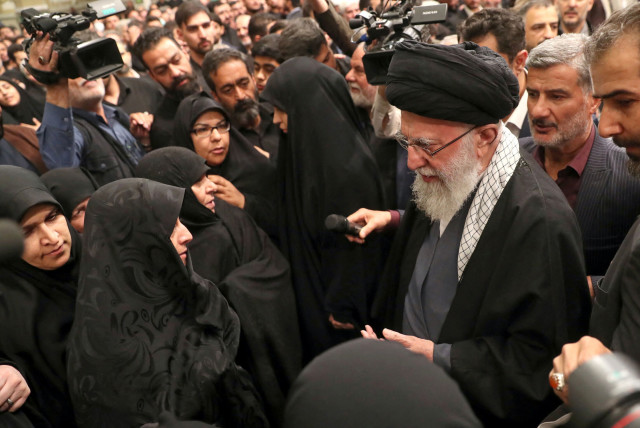Bye Raisi: How does his death change the race to succeed Khamenei? - analysis

Whoever succeeds Khamenei will set its policy regarding Israel, the West, nuclear weapons, and a host of other issues critical to the world.
Iran President Ebrahim Raisi's death does not immediately change much about the Islamic Republic's trajectory, given that this is set by Supreme Leader Ayatollah Ali Khamenei.
However, Khamenei himself is 85, and has been sick for years.
Many predicted that Khamenei had invested tons of energy and manipulations into getting Raisi the presidency so as to set Raisi up as Khamenei's successor.
Whoever succeeds Khamenei will set its policy regarding Israel, the West, nuclear weapons, and a host of other issues critical to the world.
Who's on the list?
Some Iran experts, including some former Israeli defense officials have even suggested that rivals to Raisi for the top job may have sabotaged his helicopter.
In any event, with Raisi out of the way, who are the leading candidates?
The obvious one for years, but who had seemed to take a back seat to Raisi in recent years, would be Khamenei's son, Mojtaba Hosseini Khamenei, who is in his mid-50s.
The Ayatollah's son is highly ambitious, aggressive, close to the Islamic Revolutionary Guard Corps and a force to be reckoned with.
But he would need to get over two huge obstacles: the founder of the Islamic Republic, Ruhollah Khomeini, rejected the idea of family dynasties as un-Islamic.
He hand-picked Khamenei as his successor, despite having a son, Ahmad Khomeini, who had served as his right-hand man.Khamenei himself has made public statements also against dynastic legacies.
Incidentally, there are rumors circulating to this day that six years into his rule, Khamenei had the son killed by poisoning.
So that raises the question as to whether Khamenei will be loyal to his public statements against dynasties and to his predecessor and mentor's statements along those lines, or whether he will worry more about his son's power, and even his safety should someone else take over.
Iran expert at INSS and at the Meir Amit Intelligence and Terrorism Information Center, Raz Zimmt, told the Jerusalem Post that there are two other dark horse possibilities, who now may have more have a chance.
He named, Alireza Arafi and Mohsen Qomi, who are not well-known globally, but within Iran they serve on the country's top body for selecting the supreme leader, known as the Assembly of Experts.
Both have strong religious credentials and would continue the role of the clergy atop the country's pyramid of power.
Arafi is also a member of the Guardian Council, which decides who can run for all other national offices, and was formerly in charge of the country's universities.
Qomi has been the number one or two official of multiple special offices close to Khamenei, and is also an expert in international relations.
Arafi has been described by some as more interested in technology, modernity, and innovation than many other ayatollahs, but in other contexts has come off as having a very tribal almost medieval antagonism to Christians, Sunnis, atheists, and anyone who is different than his version of Shiism.
In addition, Arafi is said to have been pushed by Khamenei on to the Assembly of Experts despite potentially not having passed certain clerical tests that most members need to pass.
Clearly, both are quite close to Khamenei, and Zimmt thought it was unlikely that Khamenei would retract his opposition to dynasties.
Yet another wild card possibility is that a top member of the Islamic Revolutionary Guard Corps takes over.
However, this would be more than just a succession as it could signal the end of the Islamic Revolution and the country's transition to more of a standard dictatorship or authoritarian regime, with merely a religious flavor.
It did not seem like many commentators were considering the interim president, Mohammad Mokhber, as a viable successor for Khamenei.
Jerusalem Post Store
`; document.getElementById("linkPremium").innerHTML = cont; var divWithLink = document.getElementById("premium-link"); if (divWithLink !== null && divWithLink !== 'undefined') { divWithLink.style.border = "solid 1px #cb0f3e"; divWithLink.style.textAlign = "center"; divWithLink.style.marginBottom = "15px"; divWithLink.style.marginTop = "15px"; divWithLink.style.width = "100%"; divWithLink.style.backgroundColor = "#122952"; divWithLink.style.color = "#ffffff"; divWithLink.style.lineHeight = "1.5"; } } (function (v, i) { });

